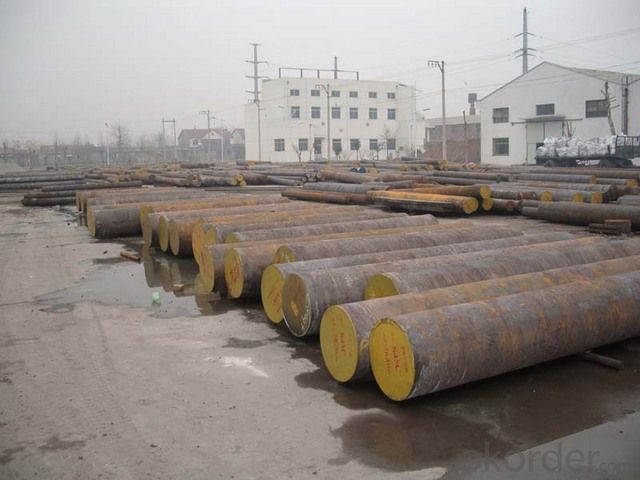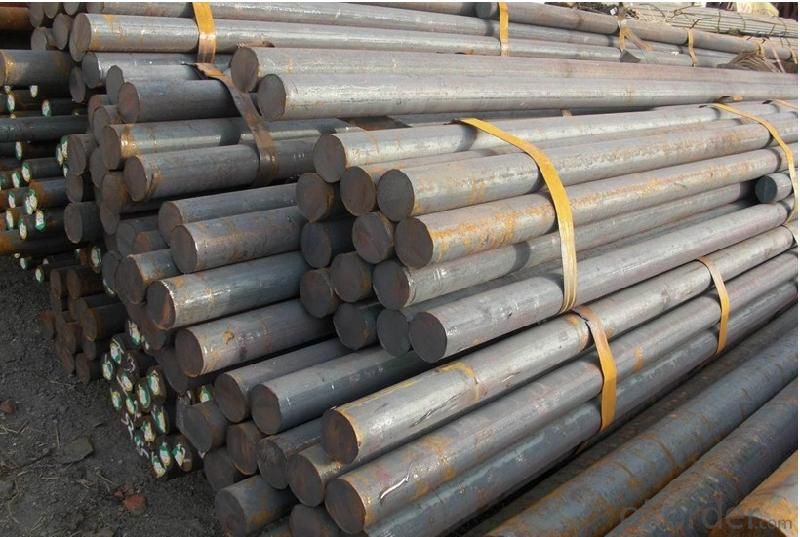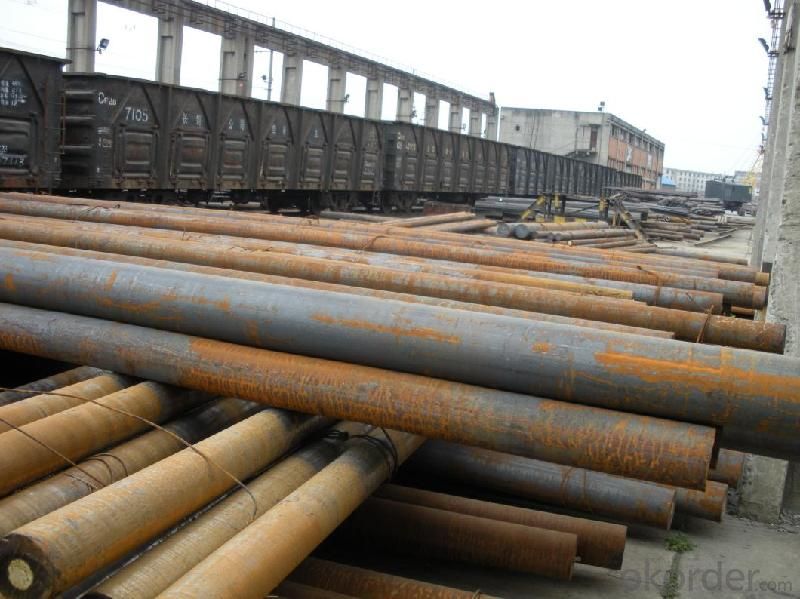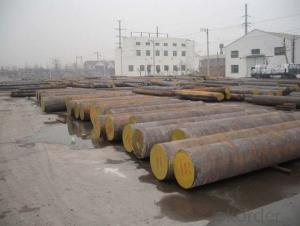20Cr Alloy Steel Bar Forged or Hot Rolled
- Loading Port:
- Tianjin
- Payment Terms:
- TT OR LC
- Min Order Qty:
- 25 m.t.
- Supply Capability:
- 50000 m.t./month
OKorder Service Pledge
OKorder Financial Service
You Might Also Like
Item specifice
20Cr Alloy Steel Bar Forged or Hot Rolled
Product Description:
Grade: ASTM 1020 / 20Cr
State:hot forging+normalizing+turning
Size:90mm to 1500mm
Length:4 to 6 meter or according to request
Billet:EAF+LF+VD
Straightness:≤4mm/m(black), ≤2mm/m(turning)
OD Tolerance:-0/+8mm(black),-0/+3 mm(turning)
Grain Fineness:ASTM E112-96 > Level 5 or better under annealing state;
Non Metallic Inclusion:ASTM E45 A/B/C/D heavy ≤2, thin ≤2.5
Test:SEP1921 CLASS C/C,D/d,E/e;GB/T 6402-91;GB/T6402-2008/ASTM A388/ASTM A709
MTC:EN 10204-3.1/EN10204-3.2 RONA/BV/SGS Certificate
Lead Time:30 to 60 days after order confirmed
Chemical composition:
Grade | C | Cr | Mn | Si | P | S | Ni | Cu | Mo |
≤ | |||||||||
20Cr | 0.18-0.24 | 0.70-1.00 | 0.50-0.80 | 0.17-0.37 | 0.035 | 0.035 | 0.30 | 0.30 | 0.15 |
Features and Use scope:
It has higer intensity and hardenability than 15Cr,worse toughness ,better weldability ,after welding it don't need to heat treatment.It used to making the parts which have special request in intensity of core and the larger-size appearance can bear abrasion ,or cementite parts of complex shape and seldom burthen ,such as gear , gear shaft ,cam, gudgeon pin ,worm and so on ,it also used to making tempering parts of big speed and can bear middle impact load.
Product Show:



- Q:What are some common applications of special steel?
- Some common applications of special steel include manufacturing of automobiles, aircraft, and machinery, as well as in construction, oil and gas pipelines, and power generation. It is also used in the production of tools, cutlery, and surgical instruments, due to its durability, strength, and corrosion resistance properties.
- Q:What are the requirements for special steel used in energy equipment manufacturing?
- The requirements for special steel used in energy equipment manufacturing are quite stringent and specific. These steels need to possess a set of characteristics that make them suitable for handling the extreme conditions and demands of energy equipment. Firstly, high strength is a crucial requirement for special steel used in energy equipment manufacturing. These steels must have excellent mechanical properties, including high tensile strength and good toughness. This is necessary to withstand the heavy loads, pressure, and stresses that energy equipment such as turbines, generators, and power transmission systems experience. Secondly, special steels used in energy equipment manufacturing must exhibit exceptional heat resistance. They need to maintain their structural integrity and mechanical properties at elevated temperatures. This is because energy equipment operates under high-temperature conditions, especially components like boiler tubes and heat exchangers. Heat-resistant steels with high melting points and low thermal expansion are thus vital. Corrosion resistance is another crucial requirement for special steel used in energy equipment manufacturing. Energy equipment is often exposed to harsh environments, including corrosive gases, fluids, and high humidity. Therefore, the special steels used should have excellent resistance to corrosion, oxidation, and erosion. This ensures the longevity and reliability of the energy equipment, reducing maintenance and replacement costs. Good weldability and machinability are also essential characteristics of special steels used in energy equipment manufacturing. Energy equipment often requires complex fabrication processes and weldments. Therefore, these steels should possess good weldability to ensure easy and reliable joining. Similarly, machinability is crucial for the production of energy equipment components, as it allows for efficient shaping and finishing. Lastly, special steel used in energy equipment manufacturing must comply with strict quality and safety standards. They should adhere to international codes and regulations, such as those set by organizations like the American Society of Mechanical Engineers (ASME) and the International Electrotechnical Commission (IEC). These standards ensure that the special steels meet the necessary specifications and performance requirements for energy equipment, promoting safety and reliability. In conclusion, the requirements for special steel used in energy equipment manufacturing include high strength, heat resistance, corrosion resistance, weldability, machinability, and compliance with quality and safety standards. Meeting these requirements ensures that the special steels can withstand the extreme conditions and demands of energy equipment, ensuring their longevity, reliability, and safety.
- Q:How does special steel perform under extreme cold conditions?
- Special steel is specifically designed to perform well under extreme cold conditions. It has excellent resistance to low temperatures and retains its strength and toughness even in freezing temperatures. This is achieved through the addition of alloying elements such as nickel, chromium, and molybdenum, which enhance the steel's ability to remain ductile and resist brittle fracture. In extreme cold temperatures, regular steel tends to become brittle and may fracture easily. However, special steel exhibits remarkable toughness and resilience. It can withstand the extremely low temperatures without losing its mechanical properties, making it suitable for various applications in cold environments. Moreover, special steel also offers excellent corrosion resistance, which is crucial when exposed to extreme cold conditions. Corrosion can be accelerated in cold environments due to factors like moisture, salt, and freezing and thawing cycles. However, the corrosion-resistant properties of special steel prevent it from deteriorating and maintain its structural integrity. Additionally, special steel has superb thermal conductivity, allowing it to efficiently transfer heat even in extremely low temperatures. This characteristic is essential in applications where heat transfer is critical, such as in cryogenic systems or cold storage facilities. Overall, special steel's exceptional performance under extreme cold conditions makes it an ideal material for various industries and applications, including aerospace, oil and gas, automotive, and construction. Its ability to maintain strength, toughness, corrosion resistance, and thermal conductivity at low temperatures ensures reliable and safe operation in severe cold environments.
- Q:Can special steel be used in the printing industry?
- Yes, special steel can be used in the printing industry. It is commonly used for manufacturing various printing components such as blades, cylinders, and rollers due to its excellent durability, hardness, and resistance to wear and corrosion. Special steel can enhance the performance and longevity of printing equipment, resulting in higher printing quality and increased productivity.
- Q:What are the different methods for improving the corrosion resistance of stainless special steel?
- There are several methods for improving the corrosion resistance of stainless special steel. Some of the common methods include alloying the steel with elements such as chromium, nickel, and molybdenum, which enhance its resistance to corrosion. Another method is passivation, which involves treating the steel with an acid solution to remove any surface contaminants and create a protective oxide layer. Coating the steel with materials like paint, powder coating, or electroplating can also improve its corrosion resistance. Additionally, proper cleaning and maintenance practices, such as regular removal of dirt and debris, can help prevent corrosion and maintain the steel's resistance over time.
- Q:How does special steel withstand high temperatures?
- Special steel is able to withstand high temperatures due to its unique composition and manufacturing process. Firstly, special steel is made from alloys that contain elements such as chromium, nickel, and molybdenum, which provide increased resistance to heat. These elements form a protective oxide layer on the surface of the steel, preventing oxidation and corrosion at high temperatures. Furthermore, special steel goes through specific heat treatment processes, such as quenching and tempering, which enhance its strength and toughness. These processes involve heating the steel to high temperatures and then rapidly cooling it, followed by reheating and slow cooling. This controlled cooling and heating process modifies the steel's microstructure, making it more resistant to thermal stress and deformation. Additionally, special steel is often designed to have a high melting point, which allows it to maintain its structural integrity even in extreme temperatures. The specific combination of elements and their ratios in the alloy contribute to the steel's ability to resist softening or melting when exposed to high heat. Moreover, special steel may also incorporate specialized coatings or treatments that further enhance its thermal resistance. These coatings can provide an extra layer of protection against heat, oxidation, and corrosion, making the steel even more durable and long-lasting in high-temperature environments. In summary, special steel withstands high temperatures by virtue of its unique alloy composition, heat treatment processes, high melting point, and additional protective coatings. These factors work together to enhance the steel's ability to resist thermal stress, deformation, oxidation, and corrosion, making it a reliable and durable material for applications in extreme heat conditions.
- Q:What are the properties of high-speed stainless steel?
- High-speed stainless steel possesses several properties that make it suitable for various applications. It has excellent hardness, wear resistance, and high strength at elevated temperatures. Additionally, it exhibits good corrosion resistance, high thermal conductivity, and retains its integrity even under extreme conditions. Its ability to maintain sharp cutting edges, combined with its high heat resistance, makes it ideal for use in cutting tools, drills, and machining applications.
- Q:What are the challenges in heat treatment of special steel alloys?
- The heat treatment of special steel alloys poses several challenges due to their unique composition and properties. One of the main challenges is achieving the desired microstructure and mechanical properties while maintaining dimensional stability. Special steel alloys often have complex alloying elements and require specific heat treatment processes to achieve the desired properties. Another challenge is controlling the heating and cooling rates during the heat treatment process. Special steel alloys are often sensitive to rapid or uneven heating and cooling, which can result in distortion, cracking, or the formation of undesirable phases. Therefore, precise control of the heating and cooling rates is crucial to avoid these issues and ensure uniformity in the final product. Furthermore, the presence of alloying elements in special steel alloys can lead to increased hardenability, making it challenging to achieve the desired hardness throughout the entire component. Special attention needs to be given to the selection of appropriate heat treatment parameters, such as temperatures, soaking times, and quenching media, to achieve the desired hardness and avoid excessive hardness gradients. Additionally, special steel alloys are often prone to oxidation and decarburization during heat treatment due to their high alloy content and exposure to elevated temperatures. These reactions can lead to surface defects and a decrease in the carbon content, affecting the final properties of the alloy. Therefore, protective atmospheres or heat treatment environments must be carefully controlled to prevent such issues. Moreover, the size and geometry of components made from special steel alloys can pose challenges during heat treatment. Large or complex-shaped components require careful consideration of the heating and cooling methods to ensure uniformity of the microstructure and properties throughout the entire component. This may involve the use of specialized furnaces, fixtures, or heat treatment cycles to overcome these challenges. In conclusion, the challenges in heat treatment of special steel alloys include achieving the desired microstructure and mechanical properties, controlling heating and cooling rates, managing hardenability, preventing oxidation and decarburization, and addressing the size and geometry of components. Overcoming these challenges requires a deep understanding of the alloy's composition, properties, and the application of appropriate heat treatment techniques.
- Q:Can special steel be used in the nuclear power industry?
- Yes, special steel can be used in the nuclear power industry. Special steel is often used for components such as reactor pressure vessels, steam generators, and fuel cladding in nuclear power plants. Special steel's high strength, resistance to corrosion, and ability to withstand high temperatures make it suitable for the demanding conditions and safety requirements of the nuclear power industry.
- Q:Can special steel be used in the chemical industry?
- Yes, special steel can be used in the chemical industry. Special steel, such as stainless steel and corrosion-resistant alloys, are often preferred in the chemical industry due to their high resistance to corrosion, heat, and chemical reactions. These qualities make special steel suitable for various applications including storage tanks, pipelines, reactors, and other equipment used in the production and handling of chemicals.
1. Manufacturer Overview |
|
|---|---|
| Location | |
| Year Established | |
| Annual Output Value | |
| Main Markets | |
| Company Certifications | |
2. Manufacturer Certificates |
|
|---|---|
| a) Certification Name | |
| Range | |
| Reference | |
| Validity Period | |
3. Manufacturer Capability |
|
|---|---|
| a)Trade Capacity | |
| Nearest Port | |
| Export Percentage | |
| No.of Employees in Trade Department | |
| Language Spoken: | |
| b)Factory Information | |
| Factory Size: | |
| No. of Production Lines | |
| Contract Manufacturing | |
| Product Price Range | |
Send your message to us
20Cr Alloy Steel Bar Forged or Hot Rolled
- Loading Port:
- Tianjin
- Payment Terms:
- TT OR LC
- Min Order Qty:
- 25 m.t.
- Supply Capability:
- 50000 m.t./month
OKorder Service Pledge
OKorder Financial Service
Similar products
New products
Hot products
Related keywords





























